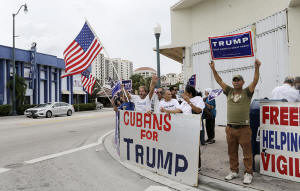Trump brands his opponents as 'communists,' a label loaded with the
baggage of American history
[May 05, 2025]
By LAURIE KELLMAN
For years, President Donald Trump blamed “communists” for his legal and
political troubles. Now, the second Trump administration is deploying
that same historically loaded label to cast his opponents — from judges
to educators — as threats to American identity, culture and values.
Why? Trump himself explained the strategy last year when he described
how he planned to defeat his Democratic opponent, then-Vice President
Kamala Harris, in the White House election.
“All we have to do is define our opponent as being a communist or a
socialist or somebody who is going to destroy our country,” he told
reporters at his New Jersey golf club in August.
Trump did just that — branding Harris “comrade Kamala” — and he won in
November. With the assent of more than 77 million Americans who cast
ballots — 49.9% of the vote — Trump is carrying that strategy into his
second term.
What he's talking about is not actually ‘communism’
In 2025, communism wields big influence in countries such as China,
Vietnam, North Korea and Cuba. But not the United States.
“The core of communism is the belief that governments can do better than
markets in providing goods and services. There are very, very few people
in the West who seriously believe that," said Raymond Robertson of the
Texas A&M University Bush School of Government & Public Service. "Unless
they are arguing that the government should run U.S. Steel and Tesla,
they are simply not communists.”

The word “communist,” on the other hand, can carry great emotional power
as a rhetorical tool, even now. It’s all the more potent as a pejorative
— though frequently inaccurate, even dangerous — amid the contemporary
flash of social media and misinformation. After all, the fear and
paranoia of the Russian Revolution, the “Red Scare,” World War II,
McCarthyism and the Cold War are fading into the 20th century past.
But Trump, 78 and famous for labeling people he views as obstacles,
remembers.
“We cannot allow a handful of communist radical-left judges to obstruct
the enforcement of our laws,” Trump said Tuesday in Michigan while
celebrating his first 100 days in office. The White House did not reply
to a request for what Trump means when he calls someone a “communist.”
The timing of his use of “communist” is worth noting.
Trump's Michigan speech came during a week of dicey economic and
political news. Days earlier, The Associated Press-NORC Center for
Public Affairs published a poll showing that more Americans disagree
with Trump’s priorities so far than agree with them, and that many
Republicans are ambivalent about his choices of focus. After the speech,
the government reported that the economy shrank during the first quarter
of 2025 as Trump's tariffs disrupted business.
On Thursday, senior presidential aide Stephen Miller stepped to the
White House podium and uttered the same c-word four times in about 35
minutes during a denunciation of past policies on transgender, diversity
and immigration issues.
“These are a few of the areas in which President Trump has fought the
cancerous, communist woke culture that was destroying this country,”
Miller told reporters.
His collection of words offered a selection of clickbait for social
media users, as well as terms that could catch the attention of older
Americans. Voters over age 45 narrowly voted for Trump over his
Democratic rivals in 2020 and 2024.
[to top of second column]
|

Cuban-Americans chant pro-Trump slogans as they show their support
for Republican presidential candidate Donald Trump, in Miami, Oct.
28, 2016. (AP Photo/Alan Diaz, File)

Smack in the middle of Miller's sentence: “communist.”
“It tends to be a term that is loaded with negative affect,
particularly for older Americans who grew up during the Cold War,”
said Jacob Neiheisel, a political communications expert at the
University at Buffalo. “Appending emotionally laden terms to
political adversaries is a way to minimize their legitimacy in the
eyes of the public and paint them in a negative light.”
A ‘Red Scare’-era figure influenced a young Trump
The threat that communists could influence or even obliterate the
United States hovered over the country for decades and drove some of
the country's ugliest chapters.
The years after World War I and the Russian Revolution in 1917,
along with a wave of immigrants, led to what's known as the “Red
Scare” of 1920, a period of intense paranoia about the potential for
a communist-led revolution in America.
“McCarthyism” after World War II meant the hunt for supposed
communists. It's named for Sen. Joseph McCarthy, the Wisconsin
Republican who conducted televised hearings at the dawn of the Cold
War that drove anti-communist fears to new heights with a series of
threats, innuendos and untruths.
Culturally, the merest suggestion that someone was “soft” on
communism could end careers and ruin lives. "Blacklists” of
suspected communists proliferated in Hollywood and beyond. McCarthy
fell into disgrace and died in 1957.
The senator's chief counsel during the hearings, Roy Cohn, became
Trump's mentor and fixer as Trump rose as a real estate mogul in New
York. The Cold War was more than three decades old. The threat of
nuclear war was pervasive.
Communism started to collapse in 1989 and the Soviet Union was
dissolved two years later. It's now Russia, led by President
Vladimir Putin.

But communism — at least in one form — lives on in China, with which
Trump is waging a trade war that could result in fewer and costlier
products in the United States. By week's end, Trump was
acknowledging the potential consequences of his government stepping
in: Americans might soon not be able to buy what they want, or they
might be forced to pay more. He insisted China would be hurt more by
the tariffs.
The real modern debate, Robertson says, is not between capitalism
and communism, but about how much the government needs to step in —
and when. He suggests that Trump is not really debating communism
vs. capitalism anyway.
“Calling people who advocate for slightly more government
involvement ‘communists’ is typical misleading political rhetoric
that, unfortunately, works really well with busy voters who do not
have a lot of time to think about technical definitions and economic
paradigms,” he said in an email. “It is also really helpful (to
Trump) because it is inflammatory, making people angry, which can be
addictive."
All contents © copyright 2025 Associated Press. All rights reserved |